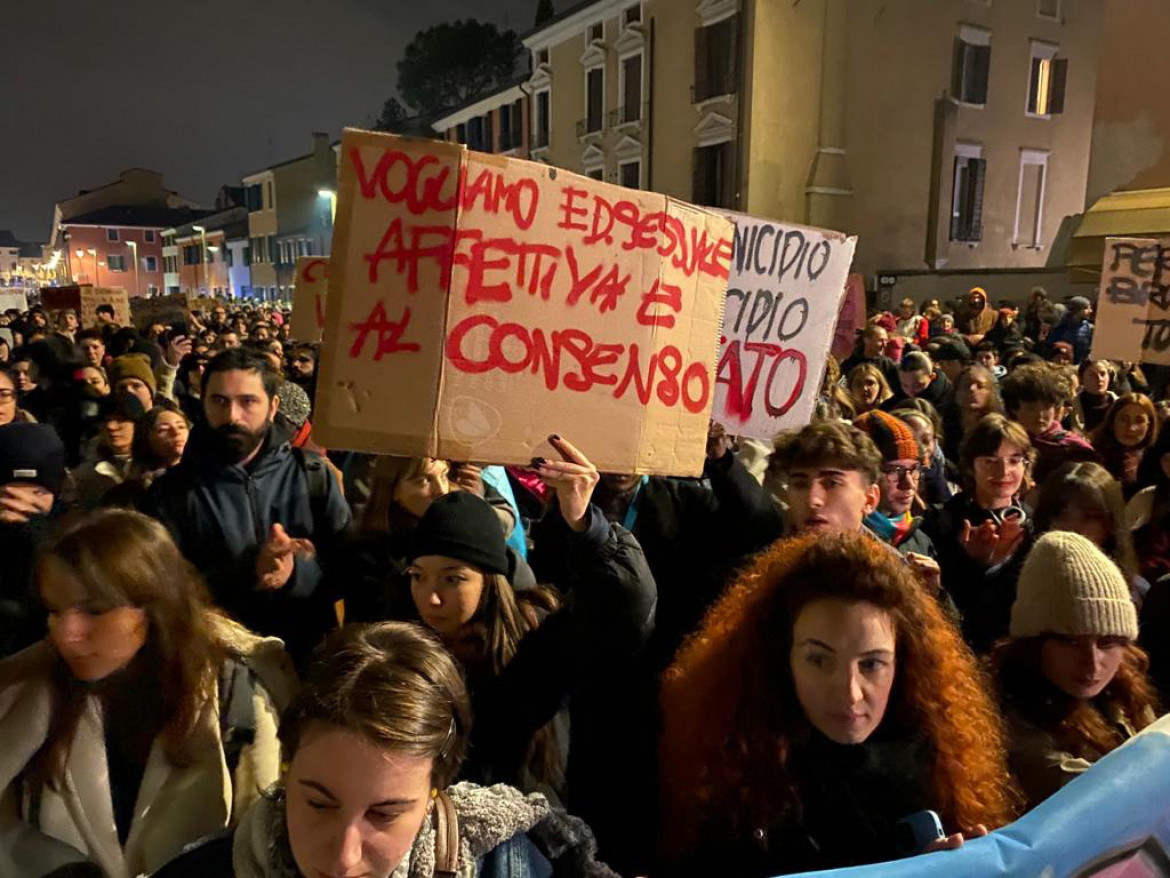Reportage
Padua burns for Giulia
Fifteen thousand people marched through the streets after a young woman’s murder. ‘Femicide is not a crime of passion, it is a crime of power. It is a state murder, because the state does not defend us and does not protect us.’

“These days I’ve been hearing a lot about [Filippo] Turetta. Many people have been calling him a monster. But he is not a monster. A monster is someone who violates the normal standards of our society – but he is a healthy offspring of the patriarchal society, which is imbibed with rape culture,” said Elena Cecchettin on Rete 4, the sister of Giulia Cecchetin, for whose murder Turetta, her ex-boyfriend, has been arrested. Her fiery words came off the television screens, spread on social media across the country, and then took over the streets of Padua, in a march populated by at least 15,000 young men and women, a human river that started last Monday evening from Piazza Portello and ended up at Piazza delle Erbe.
“Femicide is not a crime of passion, it is a crime of power. It is a state murder, because the state does not defend us and does not protect us. Sexual and emotional education must be provided so that these things are prevented. We need to fund anti-violence centers so when people need to seek help, they’re able to get it. Don’t hold a minute of silence for Giulia. Burn everything down for Giulia,” said the young woman, leaving the others in the talk show studio dumbstruck, unable to say anything in the face of her unsparing analysis, as merciless as it is factual.
That call, to “burn everything down,” was also on display on the streets of Padua – the city where Giulia was supposed to graduate from university last Thursday, but never got the chance to.
Elena Cecchettin thus broke out of the script that had already been assigned to her: from the sister of the victim, a relative to be consoled, she became a political actor – and a fearsome one at that. And not only for the all-too-predictable guests of Mediaset’s evening talk shows. Elena is not asking for life imprisonment for Filippo Turetta, who has been charged with her sister’s murder and is soon to be extradited from Germany to Italy. She’s not asking for revenge, she’s not asking for the response to the femicide committed by Turetta to be one of imprisonment and punishment – she is asking for re-education.
Elena Cecchetin chose to denounce patriarchal culture, to denounce the state as well, and to turn on its head the “not-all-men” narrative, passing back to all men their responsibility in the death of each sister.
“I will never be silent. You will never silence me,” she later wrote on social media, despite the numerous attacks from the ruling right-wing propagandists: people who judged her harshly, claiming that the way she was grieving her sister’s death was beyond the pale. People who tried to delegitimize what she was saying by pointing to her style of dress, her manner, the makeup she was wearing.
But in the streets across the country, the atmosphere is a very different one. Following Elena Cecchettin’s call, the march in Padua on Monday, Nov. 20, opened with a chorus that is a programmatic manifesto, going even further than Elena’s slogan, which got many thousands of comments on social media (including from the state police on their Instagram profile): “Today we will burn and take back all the streets of Padua.”
The march was organized on the occasion of the Transgender Day of Remembrance, the global day dedicated to the memory of transgender people who have been victims of violence. Here, its meaning became wider, turning into a mobilization that was also for Giulia and against femicides.
Elena also took part in Monday’s march. Just before it began, she had only this to say to journalists and reporters: “Keep telling the truth. I only ask you to leave me alone for a while, I am not well mentally and physically and I have to give myself time to recover.”
Thousands of people from different cities in the Veneto region came to Padua for the march. But the streets everywhere have continued to fill up in recent days, with sit-ins and protests called throughout the region and Padua becoming a nerve center: the whole city is discussing what has happened, reflecting, looking for a collective response.
On Monday morning, a large crowd gathered up in the courtyard of the University of Padua. “There’s an air of mourning at the university. The professors and lecturers keep taking minutes of silence. We’re furious. We’re not mourning,” some female students said. And the anger was palpable in the midst of Monday’s great march.
“We want to be alive and free,” read the opening banner. And many spoke up to ask: what if Filippo had been a migrant? What if he had been Black? What if he hadn’t been Italian and from a “good family”? Would all the rhetoric surrounding this case have been the same?
They were all united in one last slogan: “Against all gender boundaries and against all territorial boundaries. We left together, we will come back together.”
Originally published at https://ilmanifesto.it/padova-brucia-per-giulia on 2023-11-21
